A Summer Of Laddership: Lessons From 2014 Interns
Every summer, the ServiceSpace ecosystem gets to dive deeper into the values of holding space, deep listening, servant leadership, giftivism, and inner transformation through the lens of youth in our 10-week internship program. Each year, many of us are disarmed by the experience that unfolds. From striking moments on a 30-day Kindness Challenge to trusting in the ripples to small moments of astounding love, this summer was no exception.
From June through August, six interns ages 14 to 20 were paired up with six mentors (many of whom called themselves interns :)). Each week, the group explored a theme (such as generosity, simplicity, patience, truth) through readings, videos, personal practices, and weekly group check-in calls to reflect and share on the journey.
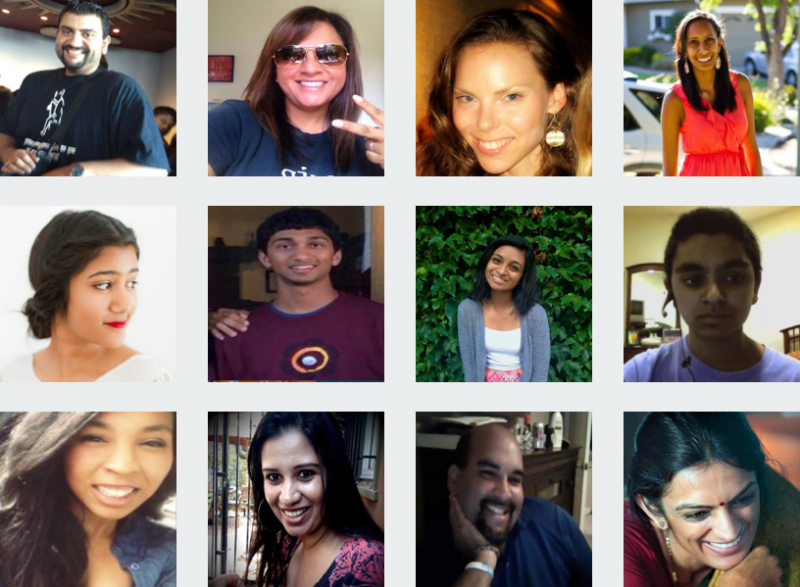
On last Saturday's Awakin Call, we had the gift of hearing from a couple interns, Priya and Vishesh, and mentors Anne-Marie and Karuna. Our mentor of a moderator, Amit Dungarani, kicked off the call with his full-of-heart introduction, and dived deep into a dazzling conversation-- the kind that catches you in a natural state of awe, as the sunrise of sincerity in their reflections unearths an instinctual rediscovery of those timeless elements of our human lives-- truth, love, fear, determination, and beyond. Throughout the conversation, the airwaves of their discoveries set sail on the landscapes of our own inner edges, and we cannot help but rethink the horizons through which we see the world.
"So what story do you want to tell?" Vishesh asks, as he recounts an experience with a reporter who had interviewed him about his experience giving Free Hugs. In line with the theme of Week 3, he keeps it simple. "I wanted to just tell her that I'm just a guy giving free hugs. I try to keep it low-key."
In this insightful hour and a half, many of us found ourselves struck, stirred, and stilled by the beauty and possibility that emerge when we collectively hold space to express these values in our thoughts, words, and ways of being. Below are some excerpts from the conversation.
Amit: We had a 14-year-old, Nilay, from LA who couldn't even imagine sitting still for 5 minutes, or not being on his gadgets, and by the end of the summer, he was sitting and meditating for an hour everyday. We had 3 young girls, Priyal, Jocelyn, and Mira, who are sophomores in high school and they worked on a variety of projects. 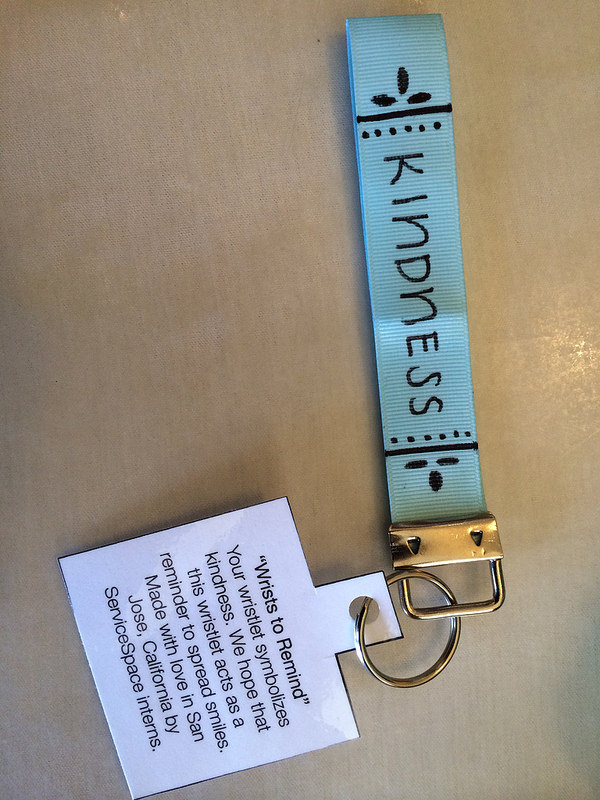 Two of them collaborated on this idea to create something called Wrists to Remind, and basically learned the art of connecting with strangers. And we had a college student, Vishesh, who interned with Google last year. This year, he could've gone to one of many other high-profile Silicon Valley internships, but he felt moved to do something different. Then we have Priya who finished her senior year of high school and is just starting off her first semester at Berkeley. She really dived deep each and every week into all the homework assignments that we put up there, and she even ended up going to a 10-day silent meditation retreat for the first time in her life.
Two of them collaborated on this idea to create something called Wrists to Remind, and basically learned the art of connecting with strangers. And we had a college student, Vishesh, who interned with Google last year. This year, he could've gone to one of many other high-profile Silicon Valley internships, but he felt moved to do something different. Then we have Priya who finished her senior year of high school and is just starting off her first semester at Berkeley. She really dived deep each and every week into all the homework assignments that we put up there, and she even ended up going to a 10-day silent meditation retreat for the first time in her life.
Priya, I'd love to start with you. Can you share a general reflection on how the internship was for you, and some of the key things you learned?
Priya: I had an amazing time this summer. I think I chose and was invited to this internship at the perfect period in my life, where I was finishing up high school and getting ready to move out of the house, and start a new chapter of my life. So this internship helped me cement those values to bring with me, and make sure that I still implement them as I continue to grow in this new academic and different social environment. This summer, I was editing stories on KindSpring. So I definitely felt like I had the best job. I basically got to read stories from people around the world who were practicing kindness in their day-to-day life and choosing to share that with everyone else. It was really inspiring to read different people's stories, from cleaning up their neighbor's yard to baking cookies for a friend in need-- all those small things that were really inspiring to read about. It was really nice experience because I was able to reflect and try to implement those things in my life.
Another thing I did this summer was a 10-day silent Vipassana meditation retreat, which really integrated well with the internship. It helped me go on a path of exploring and learning more about myself. So that was one of the hardest things that I've done, mentally and physically, but I think it was really powerful in the end.
Amit: You had been exposed to a lot of the things we talked about this summer (generosity, compassion, truth, etc.) in a variety of different ways-- at school, with peers, at home. What was so different about it this summer?
Priya: One of the most powerful things was that we weren't just reading articles and writing reflections, but we were both witnessing and participating in using these different themes and values in our own lives. So it was more of an experiential learning rather than a theoretical learning. We weren't just reading about other people and studying the effects, but we were able to see the effects in our own lives. I was able to see how-- reflecting on these different themes had me think critically on my own life, and that helped me change because I was going through it experientially. And that helped me immerse myself on making these changes and seeing the effects on myself.
Amit: Did you see the effects on the people around you as well?
Priya: Yeah. I've learned from the people around me-- from the mentors, my parents. And I aim to teach my younger sibling and others around me through example. And I think that when I started to reflect those values, people could see those changes and were inspired to think critically and change things in their own lives.
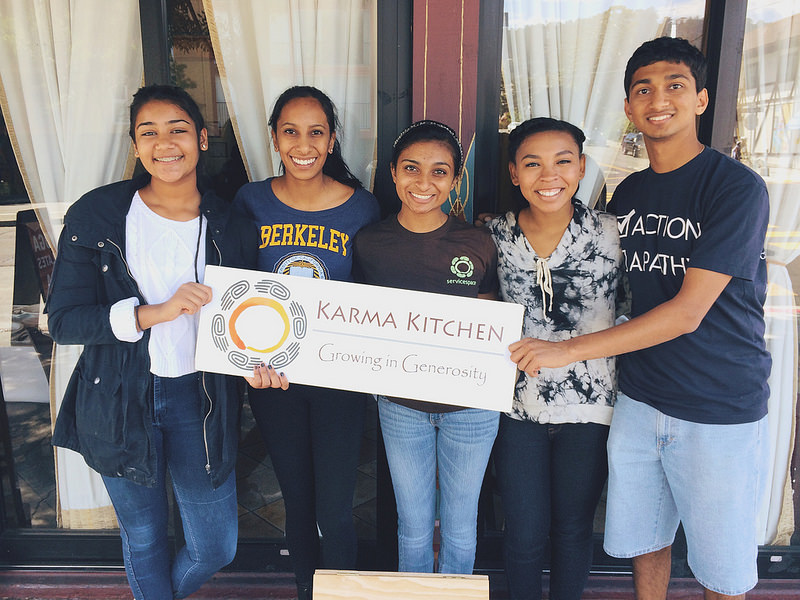
Amit: Vishesh, what about you? Can you share about what led you to the ServiceSpace internship this summer? Why did you decide to take this course as opposed to maybe a prestigious internship at Google like you did last summer?
Vishesh: I had a very strange sophomore year in college. In sophomore year at my school, you have to pick a major. And picking a major becomes this issue of people trying to plan out their lives over the course of one decision. What I didn't know at the time (but I know now, looking back after this internship) is that I ended up having all these conversations with people because I was confused. These conversations made me realize that my reasoning process for picking a major was rooted in this deep fear-- the fear that I wasn't going to "make it", whatever that means.
Like you're not going to have enough money to support yourself. You won't have a house. You won't have food. It's funny because we go to Stanford, and the only reason people come here in the first place is so that they won't have to worry about those things. Like, you talk to people and they're like, "You go to Stanford? Your life is set." But then, I'm here. And nobody really believes that, even though they're here.
So, in having those kinds of conversations, fear really became me. I started to hear that fear-based reasoning from so many people, that it really got to me. I started to worry about those things, too. I'm an engineer, and I'm probably going to be majoring in Computer Science, so I was exposed to the Stanford mentality of computer science, which is very driven towards entrepreneurship. And your worth is determined by how you can create, and how much money you can make. That really killed me, because that's not the way I was raised. I didn't believe in those things.
Then I found this ServiceSpace internship really by a fluke. I was living in a public service dorm and my RA was Tim Huang. I brought this up to him, because he seemed to have everything put together [laughs].
I said, "Tim, I'm confused. I don't know what to do."
He told me, "You know what, I know some people who might be able to help you." So he brought me to an Awakin gathering. That was my first real interaction with ServiceSpace. I remember that I was carrying around this huge knot in my stomach, because of all these things I was thinking about. And the first time I came to meditate, I literally just slept. But just being in that space, when I woke up, all those sharings just felt like, Wow this is a good thing I need to be exploring.
I'd done internships. I'd written code. It wasn't really that interesting to me. I was more interested in "What am I doing, and why am I doing it?" And I felt like that was the kind of question I could answer coming here.

Amit: That's great. Just to provide context, every week, we had a different themes that we would focus on. And that theme laid the foundation for the set of readings, video, reflection questions, and personal practices for each week. Priya, was there a particular theme, set of challenges, reflection questions that stood out and really challenged you?
Priya: My favorite themes were Energy and Determination. I really enjoyed the videos about both mindful living and eradicating complaints. They showed ways that you can make such simple shifts in your life, such as just being mindful in the shower or in the line at the grocery store. Or eradicating the unnecessary complaints that you keep repeating throughout the day, which are just generating a lot of negative energy. I think those are my favorite themes because they really made me think about the smallest things. It's not even about going out of your way to do something for someone, but even just how you come across as not constantly saying "I'm tired" or "I have this to do, I have that to do" can really make such a huge difference.
 In terms of a theme I had trouble with, I'd say Energy and Determination were both my favorite and also the hardest. This ties into my 10-day meditation course, because it was so easy to sometimes be sitting in the mediation hall and not have energy. People think that meditation is about relaxation, but when you're doing insight meditation and trying to eradicate misery and trying to get rid of those cravings and aversions, it's really tiring. Even if you're just sitting in a room, it's a lot of mental work. So Energy and Determination were really key in that, and many times it was really hard, because I was tempted to break noble silence when I was meditating in my room and I could hear my roommate crying in the bunk below me. It's really hard for me not to empathize or comfort someone when I see someone going through a hard time. My mom was also on the meditation course, and when I was going through a tough time with difficult emotions coming up, it was hard not to make physical or eye contact with her. So many times, my Energy and Determination fluctuated a bit, but they were my favorite because they were the most challenging, and they really made me work for it.
In terms of a theme I had trouble with, I'd say Energy and Determination were both my favorite and also the hardest. This ties into my 10-day meditation course, because it was so easy to sometimes be sitting in the mediation hall and not have energy. People think that meditation is about relaxation, but when you're doing insight meditation and trying to eradicate misery and trying to get rid of those cravings and aversions, it's really tiring. Even if you're just sitting in a room, it's a lot of mental work. So Energy and Determination were really key in that, and many times it was really hard, because I was tempted to break noble silence when I was meditating in my room and I could hear my roommate crying in the bunk below me. It's really hard for me not to empathize or comfort someone when I see someone going through a hard time. My mom was also on the meditation course, and when I was going through a tough time with difficult emotions coming up, it was hard not to make physical or eye contact with her. So many times, my Energy and Determination fluctuated a bit, but they were my favorite because they were the most challenging, and they really made me work for it.
Amit: For those of you who have not had the opportunity to do a 10-day meditation or Vipassana course, which is what Priya did this summer, they have something there called a practice of "Noble Silence." It's where you sort of vow through the retreat that you will not speak, write, or gesture with each other. So while you're trying to dial-down the noise on the outside, in a way you end up dialing-up the noise on the inside. So when you see things that you just feel naturally inclined to do, like seeing someone crying or an urge to run to your mother, it's really a challenge.
On the topic of mediation, one of our interns, Priyal, couldn't make it on the call today, but she wrote up this speech and wanted me to share it. I think some of it relates to that idea of sitting in stillness:
 "Hi everyone, my name is Priyal, and for those of you who don't know me, I was an intern for the ServiceSpace internship program this past summer. I can't make it because I am interviewing for a program called Amigos, which would allow me to immerse myself in volunteering in Latin American country for 4-8 weeks. I can't wait to all the great things I've learned throughout the internship at ServiceSpace on this trip. Speaking of the things that I've learned, the list is endless. Beginning with the time that one of my mentors, Amit, turned out is a relative of mine. That's not all. One of the biggest things I've noticed is that my heart has been doubled in size.
"Hi everyone, my name is Priyal, and for those of you who don't know me, I was an intern for the ServiceSpace internship program this past summer. I can't make it because I am interviewing for a program called Amigos, which would allow me to immerse myself in volunteering in Latin American country for 4-8 weeks. I can't wait to all the great things I've learned throughout the internship at ServiceSpace on this trip. Speaking of the things that I've learned, the list is endless. Beginning with the time that one of my mentors, Amit, turned out is a relative of mine. That's not all. One of the biggest things I've noticed is that my heart has been doubled in size.
Over the course of 9 weeks, I've been able to focus on themes such as kindness and generosity on a much deeper level. I'm really thankful for that. Before the internship, I simply knew the themes by their definition in the dictionary. But as the weeks progressed, their meaning deepened, and I discovered where in my life the themes come into play. The most difficult part for me were in the morning and evening sits. The first week, I saw the homework assignment, and it said, "Sit in stillness. Five minutes in the morning, and five minutes at night." So I think to myself, "Ha! That's easy-peasy." Little did I know how long 5 minutes actually was, considering I'm a very antsy person. And on top of that, the time increased an additional 5 minutes every consecutive week. But I'm happy to say that I've mastered the skill and can go for an hour in stillness. Meditation continues to be my favorite thing, and I attend Awakin gatherings as often as I can."
And whether it's an intern or even as adults, taking 5 or 10 minutes out of our days to be in silence is a very difficult practice. So it was interesting to see what came up for folks. Vishesh, maybe you can share a bit about that process of stillness or meditation for you?
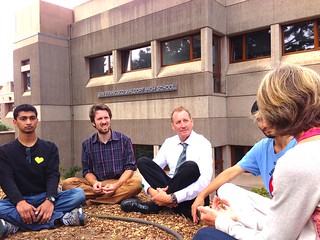 Vishesh: It was actually interesting, because I would have really diverse experiences when I'd sit in silence. Some days, it'd be really noisy and I'd be like "that didn't really feel like silence." Other days, I would sit, and 5 minutes felt like an eternity. I want to share a story with my friend which kind of highlights something that I've felt.
Vishesh: It was actually interesting, because I would have really diverse experiences when I'd sit in silence. Some days, it'd be really noisy and I'd be like "that didn't really feel like silence." Other days, I would sit, and 5 minutes felt like an eternity. I want to share a story with my friend which kind of highlights something that I've felt.
I did this thing in a program I was in, where I had everyone sit for a minute in silence. Because it was my day to lead the day, and since I was leading, I wanted to have everyone sit in silence. So we did it 3 times. After the second time, we were having lunch, and one of my friends looked at me and said, "You know, it's so funny. In the morning, we sat in silence for a minute and it didn't feel like anything at all. But that was because I didn't have anything to think about. And in the afternoon, when we sat for a minute, I had all these thoughts and it felt like an eternity."
I think I have a lot of those kinds of experiences.
Amit: I'm glad you brought that up. For those who don't know, Vishesh is being humble right now, but he was part of a leadership conference over the past few weeks. Can you share some of the experiences, in terms of what you learned in the internship and what you ended up putting into practice?
Vishesh: First, I want to say thank you to everybody, because I came out of the summer feeling so empowered and with this intention to bring more kindness onto campus. It's something we don't pay attention to, even though it's there.
I was at this leadership intensive program, and I noticed, what do we usually think of in leadership? Generally, it's people in suits, and people ruling, this whole alpha-male thing. I don't necessarily believe in those ideas. So I was wondering, how do I bring what I believe into leadership? I was really struck by Birju and how he brought a minute of silence before each meeting at a VC firm. So I thought, "If Birju can do it in a VC firm, then I can do it with 24 students."
Amit: How did you respond to your fears, and what ended up happening? Can you go through the fear itself, because whether you're a young person or adult, we so often have fears to do certain things, even though it feels right, it feels good, in the core of us. But when introducing it to others, we get caught up in a whole other set of processes. Can you go through that?
 Vishesh: The minute of silence was interesting. Before I did it, I said that I wanted to put people in the right mindset before they show up. That was also the day we were presenting to our clients, and I was the "Chair" they called it of the day. So I thought, "What can I do?" I thought of a random act of kindness. I said, "Okay, I'm going to put a nice note on everyone's door." So I did that.
Vishesh: The minute of silence was interesting. Before I did it, I said that I wanted to put people in the right mindset before they show up. That was also the day we were presenting to our clients, and I was the "Chair" they called it of the day. So I thought, "What can I do?" I thought of a random act of kindness. I said, "Okay, I'm going to put a nice note on everyone's door." So I did that.
It was funny, because I was so pumped for the minute of silence. But when we did it, the reaction was lukewarm. Nobody really liked it. I remember, we did it 3 times. We did it once before the presentations. People could understand that we'd do it before the presentations because it's grounding. And then I did it after lunch, to close it out, and people understood that we were starting a new chapter in the day. Then, I did it to close the day, and people were just like, "God, I'm not doing this." I sat for that minute, but I have a feeling that many people didn't-- they just kind of sat there looking at each other.
But I think more that that, it was funny. That morning, when I walked in, the co-chair was standing there with the post-it note that was on his door. And he said, "Whoever put this on people's doors, thank you, it was amazing." So the thing that I thought was going to be a small impact next to a big impact, it was the reverse. People really responded more to those notes than they did to my minute of silence. So I think it's really about tuning into a community and knowing what would make them feel the inner transformation, as opposed to what I think would be important.
Amit: Let's talk about that word, "inner transformation". Priya, what do you see as the importance of this idea of inner transformation? Where are you on that journey, from this summer or the direction you want to move in?
Priya: My experience with this internship has really just pushed me to reflect honestly on inner transformation. It's not something that you can plan. I mean, you can have a goal of inner transformation, but it really just happens these things start to become intrinsic. Nipun mentions about this in one of his talks-- about the shift from isolation to community, and how even just offering a smile to a stranger often leads to a conversation that can expand my network. So I think that this inner transformation comes from the experiences and the effects that I've noticed, and then it slowly becomes more daily and more intrinsic. I think that inner transformation is a never-ending topic, and it's still something that I'm working on developing.

Amit: That's great. It is a life-long process. It's nothing that you can say, "Ok, I'm going to set a goal to do X by this day and it'll be done." So you have to set up conditions in your life, or activities, to help foster that. Now you're in college, it's your first year. The internship is done. What are some of those things now that you're starting to do to foster your own inner transformation?
Priya: I think I'm trying to foster both compassion and patience. In college, I'm meeting so many new people from so many different backgrounds. It's really such a diverse place here. So one of the things I'm trying to do is really take the time to truly listen to someone, and then interpret the information that they share with me to determine what I or the community around me can do for them. So just being able to listen to someone and to take that information to see what I can do with that. The undivided attention is something I'm trying to use as I meet all these new people, and I can see how, when they open up to me, I can reciprocate that action.
Amit: Anne-Marie, could you share your process from this summer? Are there any themes that stood out to you? As you were mentoring Mira, where there any challenges that came up and how have you grown from it?
Anne-Marie: While Mira was reflecting on the themes, I learned a lot from her going through and diving deeply in these questions. I think the second week's theme of moral actions and values really set the tone for me. When Nilay had been on the call, he was asking about what it is that he values, and what are his morals. That really shined the light on myself. He said he learned what it was or what it meant by observing those qualities in others, whether it's seeing someone do a random act of kindness or somebody paying gratitude for something that he had done. I think it reminded me of a story about Mira:
When she was about 10 years old (so about 4 years back), Mira had asked her mom for her ServiceSpace (then, CharityFocus) t-shirt.
Her mom asked, "What are you going to do with this shirt?"
She said, "It's earth day. I want to paint the earth on it and say be kind to the earth."
At first, Mira's mom was a little hesitant, because she didn't want to ruin the shirt. But knowing that Mira had a beautiful intention for it, she ended up giving her the shirt. It just hit me that we do these things, we don't always know just how far those ripples will reach.
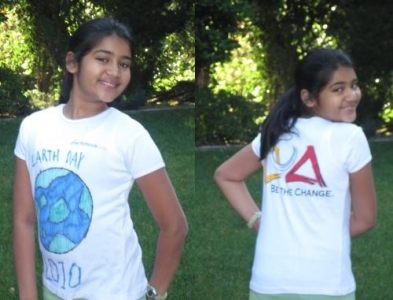
So, for me, it put me in a place to really question my morals and values and my personal conduct. I'm doing this, yes, to be a better person. And it makes me feel good to practice compassion and kindness, but I didn't realize just how much those actions can actually affect someone else.
And I think some of the challenges this past summer was just having time and space. We mentioned that we're all really busy with our daily lives, and I learned that these interns are probably more busy than ourselves [Laughs]. Yet they made the commitment to attend the calls. I feel such gratitude to be invited into this space to be a mentor, an intern, and at the same time to attend the calls. Even if I was running home after work-- I'd work up until 8 o'clock at night after my hospital shift. But knowing that you yourself, Amit, after a long day on the East Coast would be up until midnight to join these calls. So determination was a big one for me, but it was also one that was really valuable and true to my heart. You know, when you value something so much, you are determined to do it.
.jpg)
Amit: Beautiful, thank you. Vishesh, can share about one of the interviews that you conducted of someone that represented one of the values that we focused on this summer?
VIshesh: We had a week on truth and I went to my mom and I said, "Mom, we had to pick a truth hero and I picked you." Just to give context, my mom does not accept praise. Like if you tell my mom, "You're a good cook," she'll say, "I've been cooking for a long time." So she's very, very modest.
I went to her and said, "Mom, your my truth hero because I believe you tell the truth in a way that I've never seen anywhere else. It's just amazing."
She looked at me and thought about it. Then she said, "Yeah. I think I do." And I think that's incredibly indicative. My mom really has this commitment to the truth. She knows what she believes in, and she acts on that 100% without fail. Without fail, ever. If she thinks that her kitchen counter should be clean after she cooks, she will clean it no matter what happens. And I think that's what makes her interrogations so brutal. Like, when she comes to me and says, "Did you do this?" I have to be honest. Her commitment to the truth is really what makes her character so strong--when she comes to me and tells me what I should and shouldn't do, I know I have to listen to her because she herself believes everything she's saying and acts on it. I think that was a significant realization for me. My mom is an amazing person.
Amit: How do you foster inner transformation in your life now that you're out of the internship?
Vishesh: Before I left the internship, I was talking with Guri, who said, "In whatever you do, don't compartmentalize. Don't take Stanford and call that one world. Don't take ServiceSpace and call that the other world. Make sure you find ways to bridge that gap."
I said, "Yeah, yeah. Okay," but obviously that's easier said than done.
.JPG)
It turned out being awesome, and it felt like a transformative experience. I remember thinking, "Wow, it's possible! People respond to this in a positive way."
At one point, I apparently had hugged one of the Stanford newspaper reporters that was on campus. There was an email that went out, and ironically my sister's was on this email (she goes to Stanford now, too). It basically said, "There's a guy giving free hugs on campus. Can someone put me in touch with him?" My sister gave her my email. So I went to the interview, and there were basically two main questions: The first one was, "How many hugs did you give?" The second one was, "What inspired you?" I came prepared for the "How many hugs did you give" question. I decided not to answer that with a straight answer, because the number of hugs I gave doesn't really matter. But the second question was interesting. Inspiration is such a weird thing, it comes from so many different places at once. How do you give a concrete answer to that question?
Amit: What was your answer?
Vishesh: What didn't inspire me, really? Everything from all the hugs my dad's given me-- he gives me these amazing, amazing hugs. Everything from that to all the love I've experienced in Awakin Circles, Tim's "Free Compliments" were received so well by the community, everything I've been thinking about transformation within myself, and the Kindness Circle we did with all the SF Waldorf high school students-- they had just gone crazy with the free hugs! So all these things inspired me.
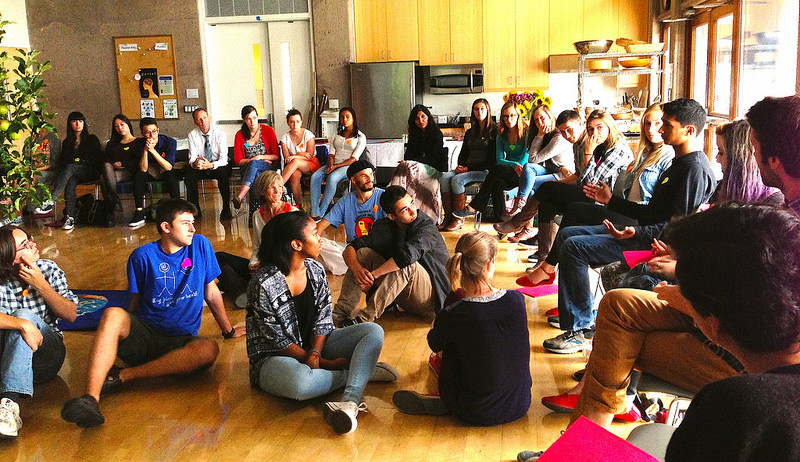
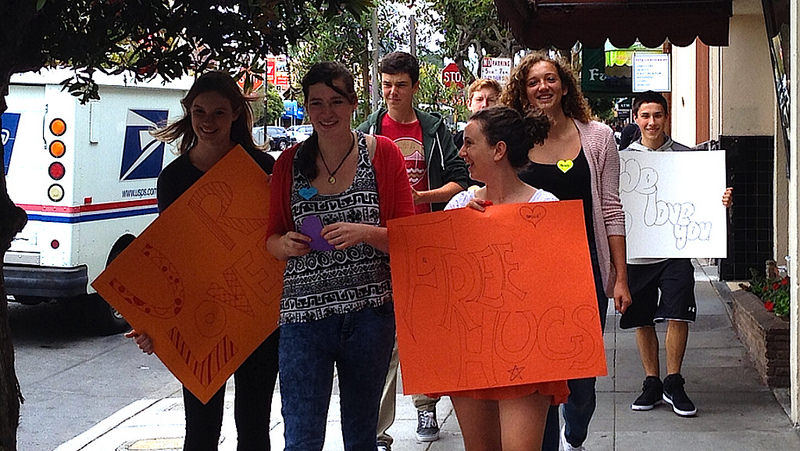
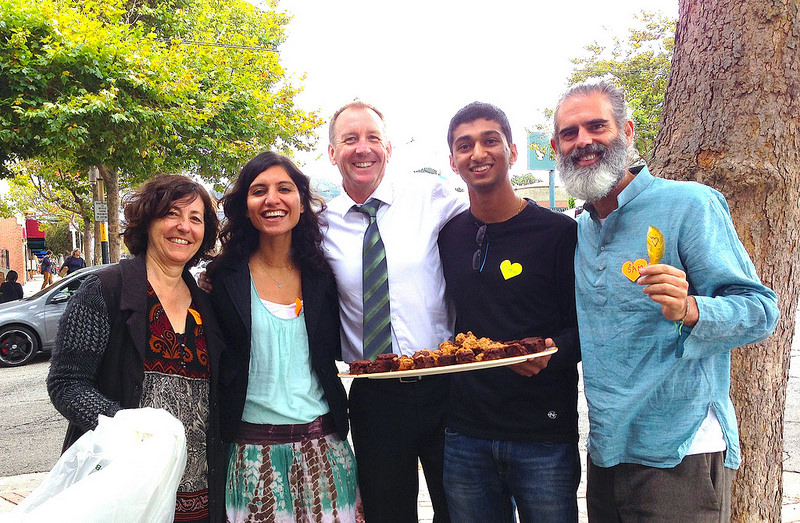
I told the reporter, "Yeah, I'm really inspired by the work I did this summer. It's really changed the way I think about things, and I wanted to share that love with everybody." But it's weird, because there's a perception, right? And this could partly be my own fear more than anything else, but if I tell her "Oh, I work for ServiceSpace," then it becomes about this guy with an organization. So what story do you want to tell? I wanted to just tell her that I'm just a guy giving free hugs. I try to keep it low-key.
Amit: It's amazing how some of these things ripple out. From all those different things that inspired you to go out and give free hugs, to you actually running into a reporter who wants to share about it, to other folks on campus. Who knows what people will do when they read about or hear about this. That's wonderful. Priya, do you want to share about a hero who embodied one of the themes we talked about?
Priya: I just wanted to share about one of the articles I read that really inspired me. It was about Raghubhai. He was a man from India who developed Polio in both his legs. So he could only walk around using hands on the ground. The article was about how you would expect resentment, negativity, and resignation from someone like this, but he ended up offering meals to elderly women in his community and offering plants to homes in the slums.
It was inspiring to read about how he wasn't set on serving as many people as he could, or becoming a hero to thousands of people, but it really just became a lifestyle for him. And he made so much effort for it to be effortless. So he's an inspiration to me, and it relates back how I've been thinking about wanting to make things intrinsic.
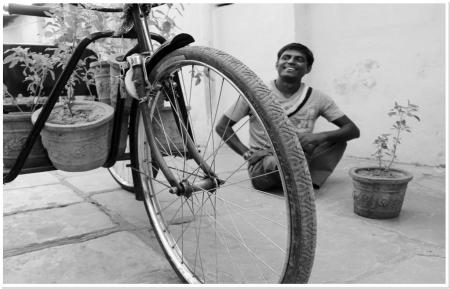
Amit: As youth who have completed high school and are now in college, what thoughts do you have on how the education system, or maybe even parents, might want to re-think the idea of learning? What's truly important in terms of raising an individual young person to be ready for today's ever-changing world?
Priya: As I mentioned before, learning through experience instead of theoretical knowledge is such an important thing. The discovery of being able to see, smell, taste, touch something yourself, or feel it within yourself, is really what cements the learning. And so, I think that, in terms of compassion and generosity, the education system needs to just set youth up to experience it themselves, because that's really what will stick. Instead of just sharing stories or having people coming in to give talks, although that's a good seed to start thinking about compassion and generosity, it's really about doing it themselves. It's about setting up service events or setting up challenges and having students reflect on that-- that's really the best way to have it stick beyond the classroom.
Vishesh: There's this quote that goes, "Tell me, and I will forget. Show me, and I may remember. Involve me, and I will understand."
Audrey: In some of my experiments with kindness, I sometimes get rejected. There are times when people don't want to accept my generosity. Or they give me a funny look. Have you had that experience, and if so, how do you respond?
Vishesh: There are so many different reactions. And there's so many different stories you tell yourself. When I was wearing the "Free Hugs" sign, all these things would happen. For instance, someone looks at you and they look at your sign and they turn away and don't want to make eye contact with you or walk away. Or some people, they look at you and make eye contact and smile. And then I find myself thinking, "What's up with that? Are you laughing at me? Or what's going on?" There is this distrust in genuine kindness.
I think that when you offer yourself and try to be open, you have to be open to receiving all those different kinds of reactions. It took me a couple hours to undo all the stories my mind was creating while I was giving free hugs, and finally decide, "No, it doesn't matter how people respond. I'm still going to be the way I am." The progress is slow. A lot of people think I'm really weird sometimes. I mean, I'm a guy. And yeah, I'm not super muscular or anything, but there's this culture of ways guys act in society, and I don't match that at all anymore. I say things like, "I love you," to random people. Things that people aren't used to. And I think that "not used to" part is what makes it weird for people.
Amit: Are you able to sit with that okay, knowing that they're not going to be used to it or may not be as accepting at first?
Vishesh: It's a fine balance. You're in community. You have an intention that you want to express. I'm thinking, "Okay, I'm trying to serve these people." So it's really about putting it in a way they can understand and appreciation. I don't want to go overboard too quickly. I've learned to be okay with it. It's a process.
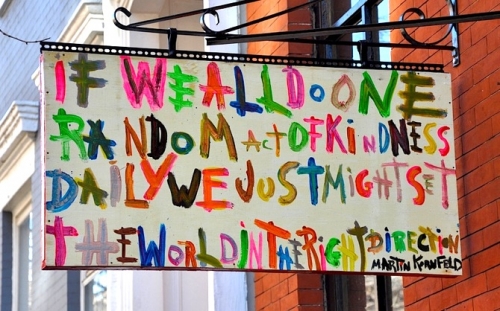
Priya: I don't think I've had an explicit example of when I've had kindness be rejected. But if it were to happen, something to keep in mind is that you have no idea what's going on in that person's life at the moment. So it's not always about you or your intentions. I mean, if you caught them at a different time, they might have had a completely different reaction. So it's just remembering that you're offering this, but that it might not be the right place or time for that. That's something I'm learning as I meet so many new people here in college. People have such complex, crazy backgrounds, or things going on, that you just have to keep that in mind.
Vishesh: Yeah, I want to second that. That you may not know where people are coming from.
Amit: Karuna was one of our other mentors from the summer. Karuna, is there an insight that stands out to you from this summer? Either a theme, or a particular experience with the interns?
Karuna: My greatest memory was during a Skype call with Priyal. I was talking to her about sitting in stillness and how she was doing. I shared with her the technique of using the breath to help still the mind, and I really wasn't sure how effective it was going to be, because it was on Skype. But I thought, "Let me just try this. It doesn't hurt. Let's see." It was amazing. We did it together, and when she came out of it, it was like were there together in person. You could sense a difference in her. You could see that she was able to gain something from it. That week, I got feedback that when she went to an Awakin gathering, she was able to continue using that, and it really deepened her experience. And as we continued through the internship, she was still able to use that as a tool.
For me, it was so meaningful because I doubted myself, but then I thought, "No, let me just share it. Whatever happens, happens." I didn't have any expectations or goals. For me, the whole internship experience was worth it for that one moment. She got a tool, but for me, it was a lesson to follow my heart and just share. No matter how minor something may be in your own mind, just share it with that other person. Because you don't know what kind of impact or seed or thought-provoking action it may be for that person. It was a fruit of my entire experience of all the weeks. When I think about it, it makes my heart tingle. It was only a 15 minute interaction, but I'm going to say that I'm going to remember it my whole life.

Amit: What was one thing that you really took away from this summer?
Priya: Pavi shared some words of wisdom with me and things to keep in mind before I went on my 10-day course. One that really stuck with me is that "there's only this moment". And that applies to both meditation-- in being present in the moment-- and also to acts of kindness. If you're given an opportunity, that's your moment to do something kind for someone else. So it's really about being present and taking advantage of the things that are happening in the here and now, instead of planning to do things later, or putting it off, as we were talking about on one of the calls about procrastination and how that adds up.
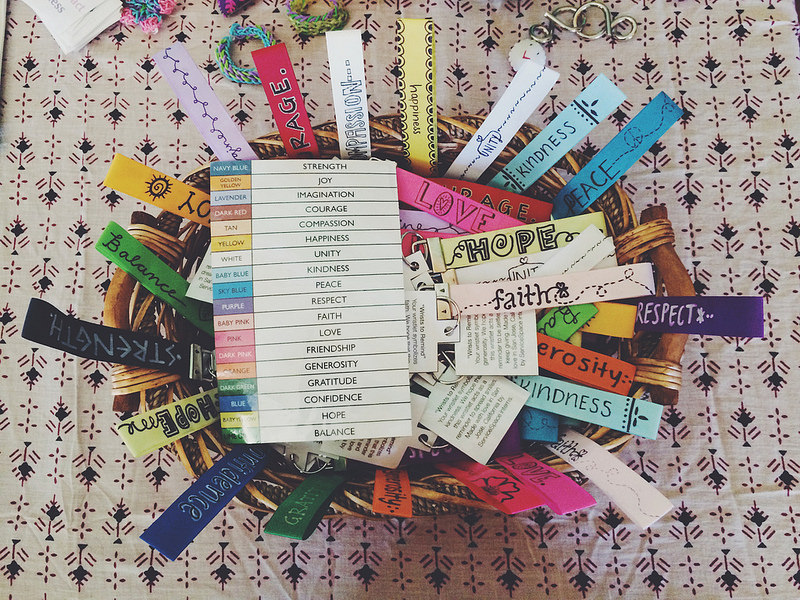
To learn more about the summer internship, visit Laddership.org/interns.
Posted by Audrey Lin on Oct 2, 2014

